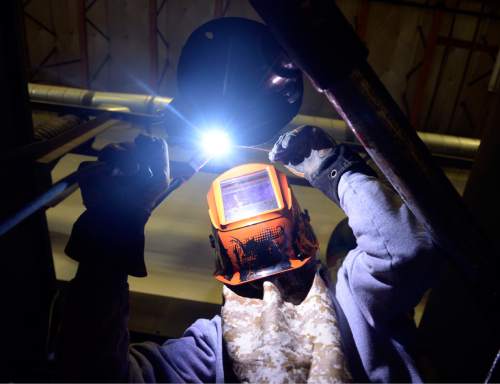This is an archived article that was published on sltrib.com in 2016, and information in the article may be outdated. It is provided only for personal research purposes and may not be reprinted.
A measure to reform Utah's technical college network and make its leaders more accountable has advanced in the Utah Legislature.
"UCAT is doing some good things," bill sponsor Sen. Steve Urquhart, R-St. George, told the House Education Committee on Monday, "but we've seen UCAT struggle a bit." The school of more than 30,000 students in 2015 watched its incoming president double back after accepting the job, and a November audit accuse it of inflating completion rates.
The education panel on Monday unanimously passed the measure to the full House after a brief discussion.
"I have one question. Why?" asked Rep. Bruce Cutler, a Murray Republican.
"Basically," responded Urquhart, "we need to."
Urquhart's bill would provide the governor and the eight individual UCAT campuses with more oversight on school policies and leaders.
The school's 15-member governing board would be required to be made up mostly of representatives from each campus. The governor also would handpick two members.
The move is designed to mirror the leadership model at the Utah System of Higher Education, where campus presidents report to trustees, instead of to a single president.
It would help ensure leaders over the school work in the public interest, Urquhart told the panel.
"When we're appointing someone who represents industry," he warned, "we're appointing lobbyists."
The school, which offers certificates from plumbing to nursing, was established in 2001 by the Legislature. At the time, lawmakers celebrated the new college as a way to grow local economies by tailoring courses to specific employers' needs.
In November, a legislative audit found the school inflated its graduation rates by including students who passed individual courses.
UCAT President Rob Brems, then set for retirement, countered that even brief coursework is worth honoring with a certificate.
The same month, UCAT announced its top pick for a new president was former Sen. Aaron Osmond. But just days later, Osmond declined the post and announced he would take an unanticipated counteroffer from his employer Certiport, which creates digital tests for schools. Osmond also stepped down from the Legislature, saying the promotion would take too much time to keep his seat in the Senate.
Brems has postponed a Mormon mission in Barcelona until a new leader is chosen.
Under Urquhart's proposal, the 15-member board of trustees, instead of the president, would oversee campuses. The governor also would be responsible for appointing members on a nonpartisan basis. And the trustees would be limited to two four-year terms.
The measure puts added accountability on the "executive president" to make sure he or she is carrying out trustees' direction.
But it would also do away with a mandate for the president to have a doctorate. A master's degree is enough, the bill says, though it maintains an existing requirement for candidates to have "extensive experience" in career and technical education.
The bill also outlines a more specific process for selecting a new campus president, establishing a search committee with equal parts trustees and other representatives from individual campuses. Faculty, students and others also can serve on the search team.
The bill must be approved by the House and signed by the governor in order to become law.
@anniebknox



